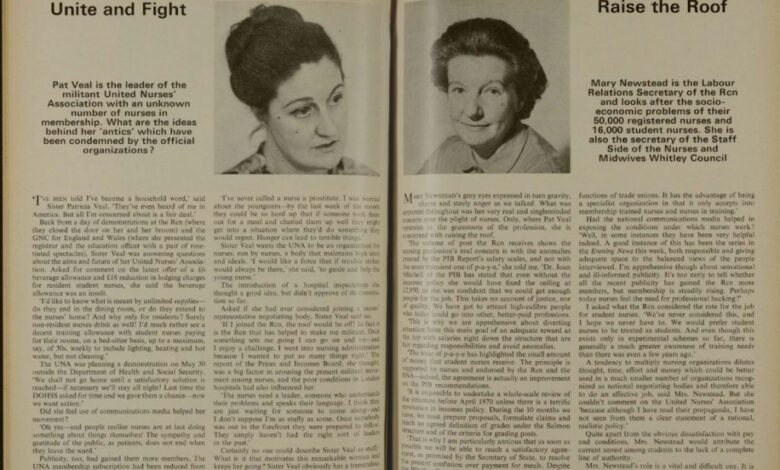Nursing Times features in new series of Call the Midwife

Nursing Times has featured in the latest series of Call the Midwife, spotlighting one of the first public campaigns by nurses to increase their pay.
The BBC’s award winning period drama, which explores the working life of nurse midwives working in London’s East End in the 1950s and 1960s, began its 13th season last Sunday.
“By the time 1969 comes around, its clear nurses’ pay has fallen. They’re upset and they’ve just had enough”
Teresa Docherty
Episode one teleported viewers back to 1969, a pivotal year for the nursing profession as they organised themselves nationally in the fight for fair pay.
In the episode, pupil midwife Joyce Highland, played by Renee Bailey, tells her fellow students: “I’ll read out loud from the Nursing Times and feed our minds.”
She goes on to tell her peers about the new ‘Raise the Roof’ campaign from the Royal College of Nursing (RCN), which led to the largest single increase in nurse salaries in the history of the profession.
The campaign started when nurses realised their pay was falling behind other public sector employees and the RCN wanted to bolster public and political support for a substantial increase in nurse pay.
At the time, government policy meant that pay rises were restricted to just 4.5%.
The term ‘Raise the Roof’ was coined due to the emphasis in the campaign on increasing the upper end of a nurses’ salary, seen as a vital tool for keeping people in the profession.
The RCN, which was demanding a 28% pay uplift for the profession, led a highly-organised campaign that involved leafleting, lobbying and private negotiations with government officials.
Original coverage of this campaign can be found in the Nursing Times digital archive.

Nursing Times original coverage of the Raise the Roof campaign in 1969
The RCN’s joint head of libraries and archives, Teresa Docherty, told Nursing Times that it was one of the first times that nurses had led a public campaign to improve their pay.
“By the time 1969 comes around, its clear nurses’ pay has fallen,” she explained. “They’re depressed, they’re upset and they’ve just had enough.
“I think that is something which is probably in common with what’s happening now,” noted Ms Docherty.
After committed campaigning and lobbying, the RCN eventually succeeded with its mission and nurses were handed a 22% pay rise by ministers on the grounds that they were a “historically underpaid group”.
Ms Docherty explained that this piece of history showed that organisations representing health workers have been able to negotiate large sums for their members, which means that people should not view the demands of current trade unions as out of reach.
She said: “In some of the current debates, people say, ‘those are huge pay increases and historically this has never happened’.
“Well actually it has happened, and they have occasionally been given because health professionals pay has fallen so far behind what it should be.”
The 1960s called into question whether the RCN was purely a nursing education body or was becoming a professional membership body that was “leaning into more trade union activity”, said Ms Docherty.
Some describe this period as a turning point for the organisation, marking a new era where the RCN would act as a force in industrial disputes.
Ms Docherty explained that, during the 1960s, the college saw “a real increase in the number of nurses who were members”.
She said: “By the end of the 60s [the RCN was] representing a lot more people, people who are on lower salaries, a much more mix of nurses in terms of employers and regions and where they work in terms of specialisms.”
Moving towards new forms of organising expanded the RCN’s reach, bolstering the organisation’s membership. Then, in 1976, the RCN registered itself as a trade union.
Nurses had several reasons for wanting to involve themselves in the 1969 Raise the Roof Campaign.
In Call the Midwife, Joyce Highland said it was not just about pay, but about respect for the profession.
“My ambition is to be a hospital matron and I will want a wage that reflects how hard I am going to work,” she said.
Meanwhile, Nancy Corrigan, played by Megan Cusack, said she had trained for four years and still could not provide a home for her and her daughter.
Ms Docherty noted that these reasons have been echoed in contemporary campaigning to improve nurses pay, including the ongoing dispute the RCN has with the government over the 2023-24 award.
She said: “The lack of decent pay is pricing them out of the profession and is pricing them out of being the best professionals they can be.”






